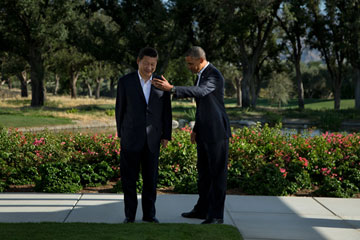
President Barack Obama, right, welcomes Chinese President Xi Jinping at the Annenberg Retreat at Sunnylands, Friday, June 7, 2013, in Rancho Mirage, Calif.
(3 of 5)
The pivot is about more than handshakes and free trade, however. It's also a muscle flex. The Pentagon is deploying more aircraft carriers, destroyers and submarines in the region and says it will deploy 60% of its overseas forces in Asia, up from the current 50%. Officials have said those forces will be exempt from upcoming Pentagon budget cuts. The Air Force recently announced plans to move more fighter jets to Singapore, Thailand and India, and one U.S. official said bombers could eventually be stationed in Australia. Talks are under way with the Philippines about a substantial U.S. presence there. A new force of 2,500 Marines is planned to be based on Australia's northern coast. And in April the U.S.S. Freedom sailed into Singapore--the first of four new littoral-combat ships that will operate continuously out of the country's Changi Naval Base. Though Washington officials play down their significance, these military moves delivered a clear message to China: Asia pivot targets Beijing, declared a 2012 headline in the Global Times, a Chinese Communist Party--linked newspaper.
What alarms Beijing brings some comfort to other Asian states, which see the U.S. providing a reassuring counterweight against Chinese assertiveness, especially over its claims to contested waters and territories. The Chinese have patrolled shoals near the Philippines and arrested Vietnamese fishermen who strayed into supposed Chinese territorial waters. In March, Vietnam claimed that a Chinese ship pursued and fired on a Vietnamese fishing vessel. China has amplified its claims to a long-disputed array of uninhabited islands in the East China Sea--which Japan calls the Senkaku and China calls the Diaoyu and which are located in waters thought to be rich in oil and gas. Japan says a Chinese ship locked its fire-control radar onto a ship and a helicopter belonging to Japan's Self-Defense Forces near the islands in January.
China isn't the only Pacific nation picking fights: Japan and others have made aggressive maritime claims. But for many, China's new attitude was all too neatly symbolized last year when Beijing unveiled new passports bearing a map of the People's Republic that draws China's borders around disputed territories from India to Southeast Asia. India's Foreign Minister deemed the new borders "unacceptable," and a Vietnamese official described the move as "one very poisonous step by Beijing among their thousands of malevolent actions."
Now countries that once rejected American influence are open to it. Take the Philippines. In 1991 the former American colony shuttered the Pentagon's largest Asian military base, at Subic Bay. Currently it is talking to Washington about a new influx of U.S. troops and naval vessels to rotate through the country "for the protection of our West Philippine Sea"--the Filipino name for part of South China Sea.
Counterweight or Cold War?
American officials and experts believe that a stronger U.S. presence can provide vital stability through a strategic balancing of powers. "We have a region where the countries clearly don't like each other," Gordon Chang, author and commentator, told the Aspen Security Forum in July. "Some of them want to go to war. We need to be there to maintain the peace."
